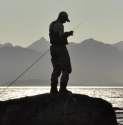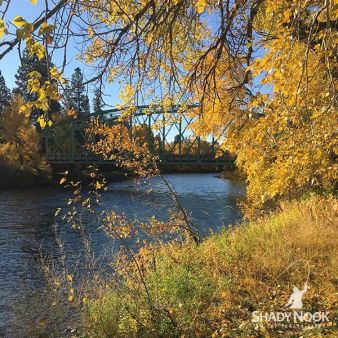Jim Klug is the co-owner, producer, and writer for Confluence Films (www.confluencefilms.com), creators of DRIFT, RISE, CONNECT, and the upcoming film WAYPOINTS. He is one of the best photographers of the industry and his work has appeared in dozens of different magazines, books and other publications. As founder for destination angling entity Yellow Dog Fly fishing Adventures, Jim has been fortunate enough to travel to many of the world's top destinations, including Belize, Bahamas, Central and South America, India, Asia, Africa, the Seychelles, throughout Europe, and to all fifty of the United States. Jim currently sits on the Board of Directors for AFFTA (the American Fly Fishing Trade Association), Belize's Turneffe Atoll Trust and the Recreational Boating and Fishing Foundation (RBFF). It is our pleasure to share Jim´s words with you.
Fd: When did you start fly-fishing? Can you tell us about your memories from those times?
JK: I started around age nine to ten. My grandfather was a great angler who spent his life traveling and writing about fishing. He was a big influence in my introduction to angling and really inspired the love for the sport that I hold today. I grew up in Central Oregon, surrounded by amazing rivers. As soon as I could drive, I ventured out across the state, chasing everything from steelhead to Lahontan cutthroat. I would call those my serious "discovery years," and I probably loved fly fishing more at that time in my life than at any other.
Fd: What does fly-fishing mean for you?
JK: I have been very fortunate to build a legitimate career in the world of fly fishing. It is what I do for a living, but it is also something that I truly love. For me, the greatest things about the sport is the places that it has taken me (literally all around the world), as well as the great people that I have met through angling. I have seen amazing scenery, caught incredibly unique and exotic species, and met some of the most interesting and fascinating people I could ever imagine.
Fd: When did you get started with photography? And, how did you become a professional photographer?
JK: I have always enjoyed photography, even as a kid. I got serious about it in the mid-nineties, when I was traveling to saltwater destinations and visiting a lot of beautiful, colorful places. Over the years, I've been more or less self-taught, which has been fun, but also made for a slower-than-average progression professionally! These days I look back on stuff that I shot ten or fifteen years ago and think to myself, "Man . . . I wish I could re-shoot that stuff knowing what I know now!"
Fd: Photography is one of your passions along with fly-fishing. How do you handle both at the same time when you are outdoors?
JK: To be great at both is a hard thing. I know very few people who I would label as great photographers AND great anglers. The list is short and I am definitely not on it! Brian O'Keefe is one for sure. He's a great photographer and one of the most gifted anglers I have ever fished with. Several years ago, I decided to focus on one or the other. These days, when I travel, I am heavy on camera gear and usually light on fishing gear. I probably spend 90% of my time shooting, and very little time actually fishing. The one saving grace, however, is that I am usually traveling with great anglers in some seriously amazing places. That is something that definitely helps to "lessen the sting.”
Fd: What can you tell us about your guiding times?
JK: I spent my early twenties guiding in the Western U.S., in incredible places like Oregon, Montana, Colorado and New Mexico. I was lucky to work with and learn from some of the best guides in the industry at that time. These days, I get a lot of calls from people looking to work in the fly fishing and travel industries. I tell them all that the most valuable experience you can have is actual on-water guiding experience. That is where you really learn to be a great angler and acquire the skills required to catch fish in every conceivable situation. And not through catching fish yourself, but by putting other people—many of whom are pretty inexperienced anglers—on to fish on a consistent basis. You also learn how to deal with clients, how to really take care of your customers, and how to interact and work with all types of people. The great thing about working in this industry is that you rarely have to deal with true a-holes. Occasionally there’s a tough one, but for the most part, people that fly fish are usually pretty happy.
Fd: What can you tell us about Confluence Films? The mission behind those great movies?
JK: My partner Chris Patterson and I started the company after a few nights of beer drinking and campfire discussion while floating Montana's Smith River. Chris has worked as the director and head cinematographer for Warren Miller Ski Films for more than 20 years. He's also shot everything from Leonardo DiCaprio productions to National Geographic projects. Needless to say, he knows a lot about shooting and a lot about film production. However, at the time we formed the company, in 2006, he knew very little about fly fishing. I, on the other hand, had grown up in the industry, knew the sport pretty well, and, through my "day job" as the director of operations for Yellow Dog Flyfishing Adventures, had been all over the world and collected a lot of great experiences. I knew nothing at all about the film business, which is probably why this partnership has worked out so well. He brings the professional film and production side of things to the equation, and I bring the stories, the off-the-grid locations, the people and the species! Our biggest goal is to profile not only the sport of fly fishing, but also the extraordinary places it takes you and the great people that make this sport their life. Our goal with every single segment is to tell a story. It can be about a person, about a location, about a specific species, or about something that may only be marginally related to fishing. Regardless of the focus, the first rule is that it has to have a great story. The second rule is that Chris and I never feature ourselves in any of these segments or any of our films. Too many other great profiles and interesting individuals are out there in the world of fly fishing to worry about our stories! So far this formula seems to be working for us.
Fd: You have been travelling all over the world for years because of Yellow Dog.
A) Which are your favorite fresh and saltwater spots? This is a hard question, and one that I get all the time through my work with both Yellow Dog and with Confluence. For saltwater, I would have to say Belize and the Seychelles (and St. Brandon's Atoll in the Indian Ocean). For freshwater, I love Patagonia (both Argentine and Chilean Patagonia) and Alaska. That said, the list of amazing places that I always look forward to fishing is long! This is probably a question that is better answered with a "Top Ten" list!
B) Could you tell us some of your best memories from your trips? Any funny story or risky situation? The best memories always seem to include great people that I have been fortunate enough to travel with. Great fishing companions always make for great memories. Through both Yellow Dog and Confluence, it seems that I am often-times traveling to some out-of-the-way places, areas that are not always associated with fly fishing. Even in the most uncomfortable, out-of-the-way places and situations, however, it always seems that fishing is the one thing that breaks the ice and immediately creates common ground. Even in tense places like the Middle East and some remote areas of Africa, the sight of rods and reels always seems to warm people up and bring out their best. As for risky situations, I would like to say that I am getting better at avoiding these now that I am a father with young kids. That would probably be a lie, however. Can I say that I am more aware of risky situations and at least trying to avoid them? I've had an interesting few years of boats flipping, sketchy flights and a fairly scary accident last year in Bolivia. I'm sure the next few years will be a lot smoother. At least that's what I am telling myself.
C) Any special memories of the people you fished and worked with in your trips? With Confluence, I have had the great pleasure of working with some of the best anglers, the best people, and the finest professionals in the industry. The list is too long to write out, but I would certainly include O'Keefe, John and Amy Hazel, Jeff Currier, Greg Vincent, Jimmy Bartschi, John Stiehl and really everyone else that we've worked with over the course of four films and more than 25 different segments. That is probably my favorite part of making these films: the casting and selection of who we're going to profile and cast. Beyond the films, I would definitely include my Yellow Dog partner Ian Davis. He's a great rod and great to travel with. And finally, my very favorite fishing companions are my wife and kids. My kids are just now getting old enough to enjoy fishing and my hope is that we have a lot of great years ahead of us. I'm doing a father-daughter trip with my seven year-old in a couple of weeks to Belize. Her goal is to catch her first bonefish on a fly without dad's help.
Fd: Which is your favorite species, and why?
JK: I would have to say permit take the top spot for me. When fishing, nothing gets me going as much as feeding and tailing permit found in skinny, shallow water. I honestly believe that is as good as it gets! Big rainbows in Alaska and Kamchatka are definitely up there as well. As far as the "coolest species" out there, I would have to say that the Golden Dorado, African Tigerfish and large Payara are the ultimate, hardcore "Man Slam". If Hemingway were alive today, these are three species that he would no doubt be chasing.
Fd: Some final words.... free writing.
JK: Life is short, so do what you love. I hear people tell me all the time, "I wish I could do what you do," or "I would love to trade my job for yours." My answer is, "So do it." You get one life (unless you’re Buddhist) so you better get out there, live it and enjoy it. Fish live in amazing places - almost all of them are beautiful - which is one of the things that makes this sport so amazing. Enjoy every moment of your time on the water. Appreciate the trips, the adventures, the unexpected, the camaraderie, and the people that you meet through fishing. It is an incredible community full of amazing people. Some of the best in the world!



















































































